Key takeaways:
- Clickbait culture thrives on curiosity, often prioritizing sensationalism over genuine content, leading to a superficial understanding of issues.
- Political media platforms heavily influence public discourse and must balance attracting clicks with maintaining journalistic integrity.
- Personal experiences highlight the frustration and misinformation stemming from misleading headlines and sensationalized articles.
- Strategies like critically evaluating headlines, choosing reputable sources, and reading summaries can help avoid clickbait and promote informed engagement.
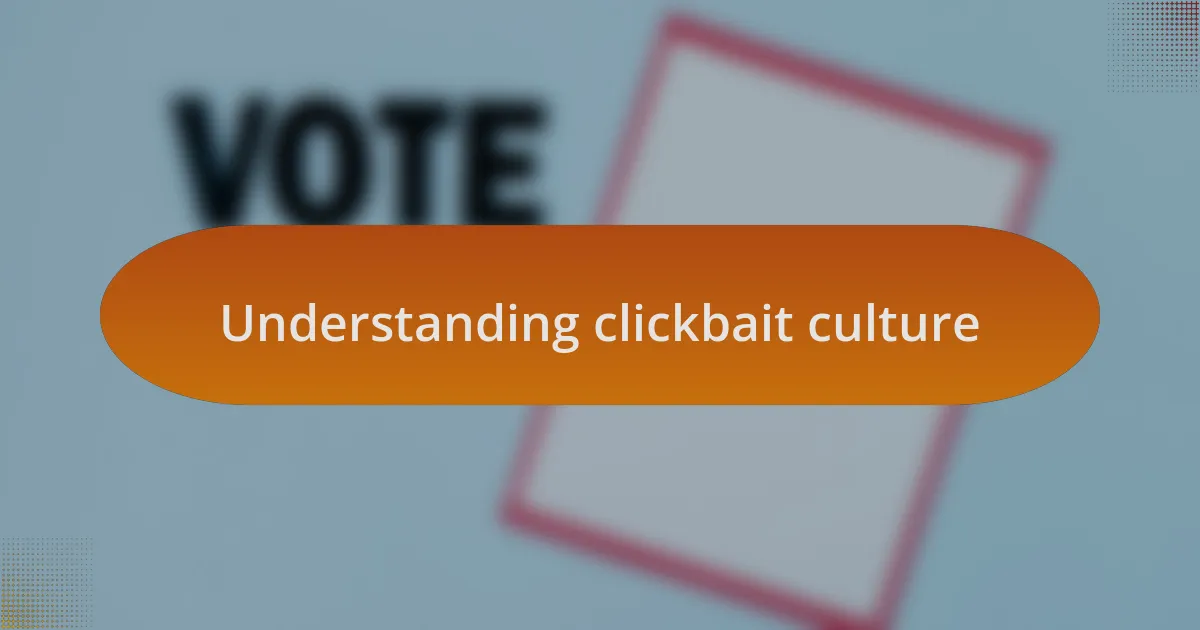
Understanding clickbait culture
Clickbait culture is fascinating, isn’t it? It thrives on our innate curiosity, often dangling tantalizing headlines that promise more than they deliver. I remember a time I clicked on an article titled “You Won’t Believe What Happened Next!” only to find a mundane update. It left me feeling frustrated and questioning the integrity of the source.
What strikes me the most is how clickbait manipulates emotions. It can elicit excitement, outrage, or even fear, compelling readers to engage immediately. I often wonder, why do we succumb to these tactics? In my experience, amidst the noise, critical thinking seems to fade, and sensationalism takes the lead, overshadowing well-researched, important stories.
Navigating this landscape requires awareness. We’ve all been there—identifying a headline that seems too outrageous to be true, only to realize it’s just designed to grab attention. This constant tug-of-war between genuine curiosity and the lure of clickbait has made me more discerning in my media consumption. Have you found yourself in a similar position?
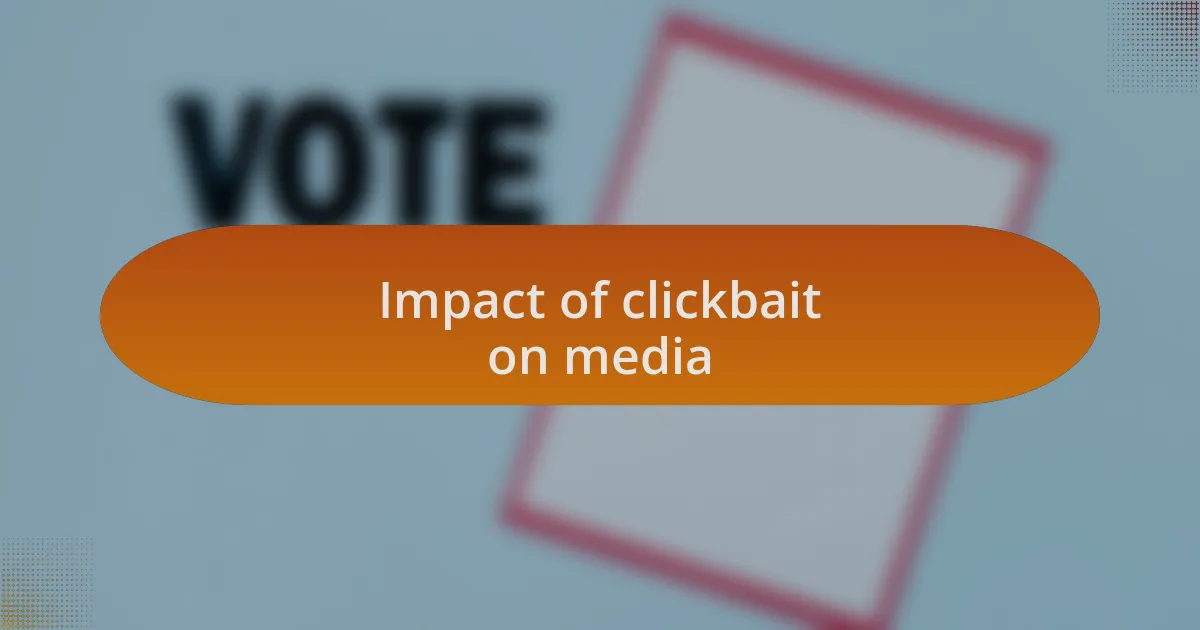
Impact of clickbait on media
The impact of clickbait on media is profound and far-reaching. I’ve noticed that it often leads to a superficial understanding of important issues, as headlines prioritize shock value over substance. When I come across articles that highlight scandalous details without providing context, I can’t help but feel that we’re missing out on the deeper narratives that matter.
In many cases, clickbait creates a cycle of misinformation. I recall reading a particularly outrageous headline that made me think twice about a political figure, only to realize later that the article was dramatically skewed. This tendency can polarize opinions, causing readers to latch onto sensationalist claims instead of fostering meaningful discussions based on facts.
Furthermore, the incessant need for clicks pushes journalists to prioritize eye-catching headlines rather than thoughtful reporting. I often find myself asking—what does it mean for the future of journalism when engagement is weighed more heavily than integrity? This dynamic not only undermines the credibility of the media but also contributes to a culture where truth becomes secondary to entertainment.
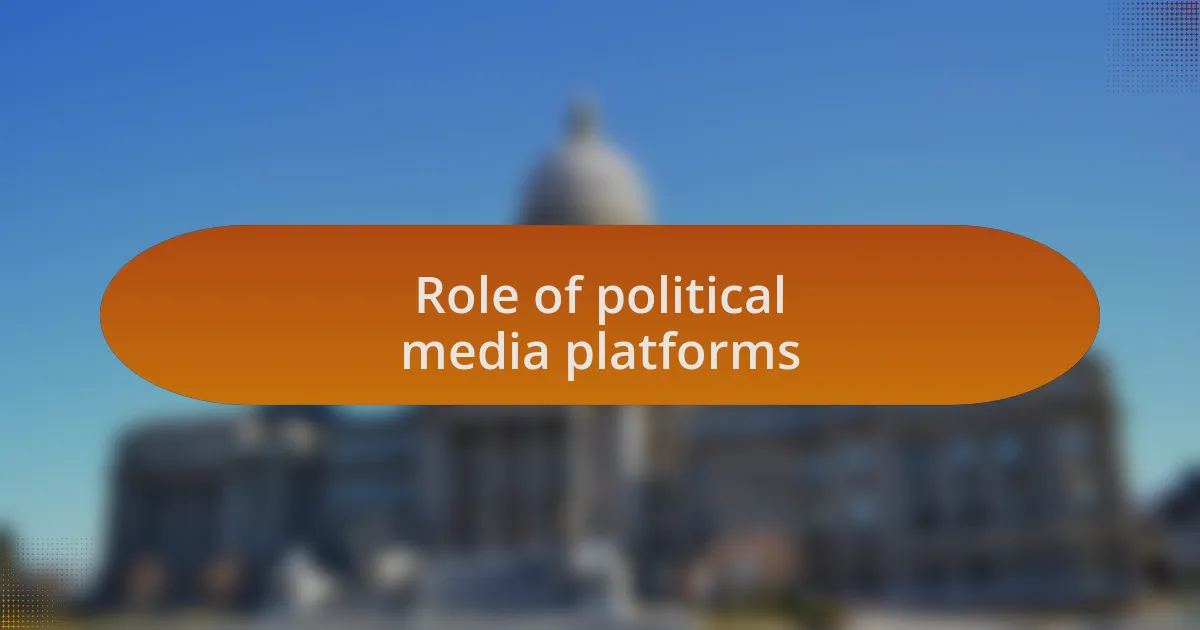
Role of political media platforms
Political media platforms play a crucial role in shaping public discourse. From my observations, they serve as the primary medium through which people engage with political issues. I’ve often found myself debating with friends about an article I read on a particular site, realizing just how much these platforms influence our understanding and viewpoints.
Moreover, these platforms hold the responsibility of filtering and presenting news in a way that encourages informed citizenship. I remember encountering a politically charged thread in a comment section, where users engaged in deep discussions that stemmed from a single article. It struck me how a well-researched piece could spark genuine debate, while poor-quality content often leads to confusion and conflict among readers. How can we expect to cultivate a politically savvy public if the sources we rely on are riddled with sensationalism?
In addition, the platforms must navigate the fine line between attracting viewers and maintaining journalistic integrity. Personally, I’ve experienced the frustration of clicking on a headline that turned out to be misleading, leaving me feeling duped. It makes me wonder: as more readers turn to these platforms for information, will they continue to prioritize clicks over quality? Each decision made by these media outlets has a ripple effect, influencing how we perceive and engage with the political landscape.
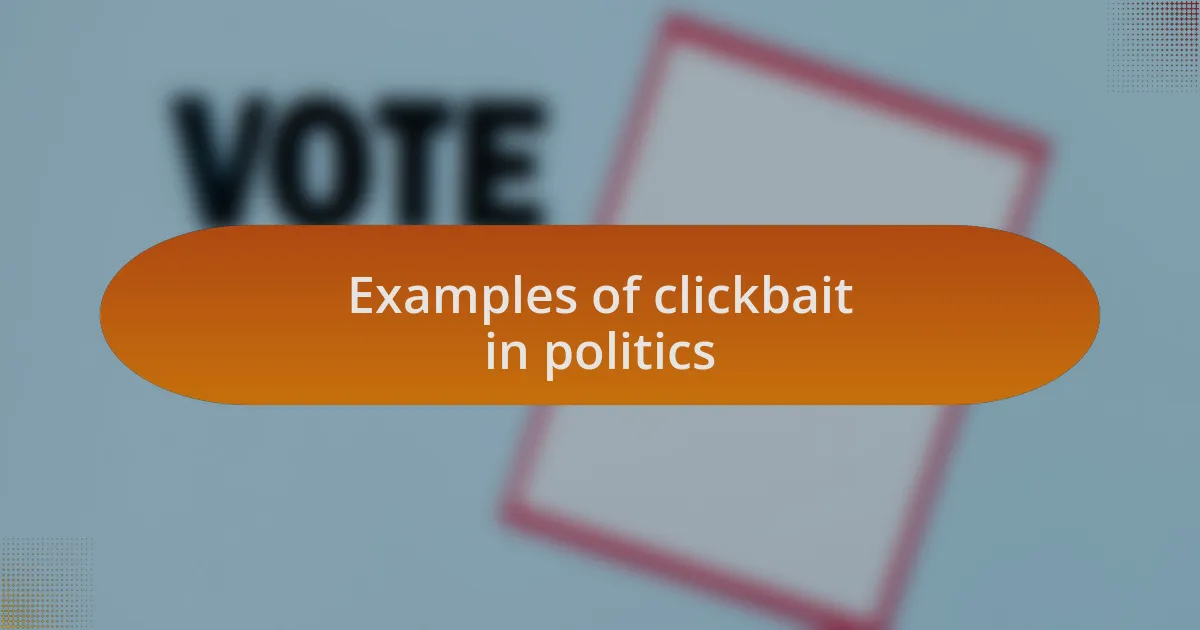
Examples of clickbait in politics
In the realm of political media, I’ve noticed headlines that promise shocking revelations but often deliver little substance. For instance, one article claimed to uncover a “hidden scandal” involving a prominent politician, only to present a series of vague allegations without any concrete evidence. I felt a mix of annoyance and disappointment after reading it—why do we allow such tactics to overshadow genuine journalism?
Another striking example was a viral post that suggested an imminent political crisis over a minor legislative change. The headline capitalized on fear, with phrases like “government in disarray!” That caught my eye. I couldn’t help but think about how this approach manipulates our emotions. It’s troubling to consider how sensationalized stories can distort our understanding of complex political issues.
Then there are the misleading comparisons often found in clickbait articles. I remember clicking on a piece that juxtaposed two entirely different political figures, suggesting one was a “doppelganger” of the other. The sensational angle overshadowed any nuanced discussion about their actual policies. It left me questioning: how do we reconcile our need for engaging narratives with the responsibility of presenting accurate information?
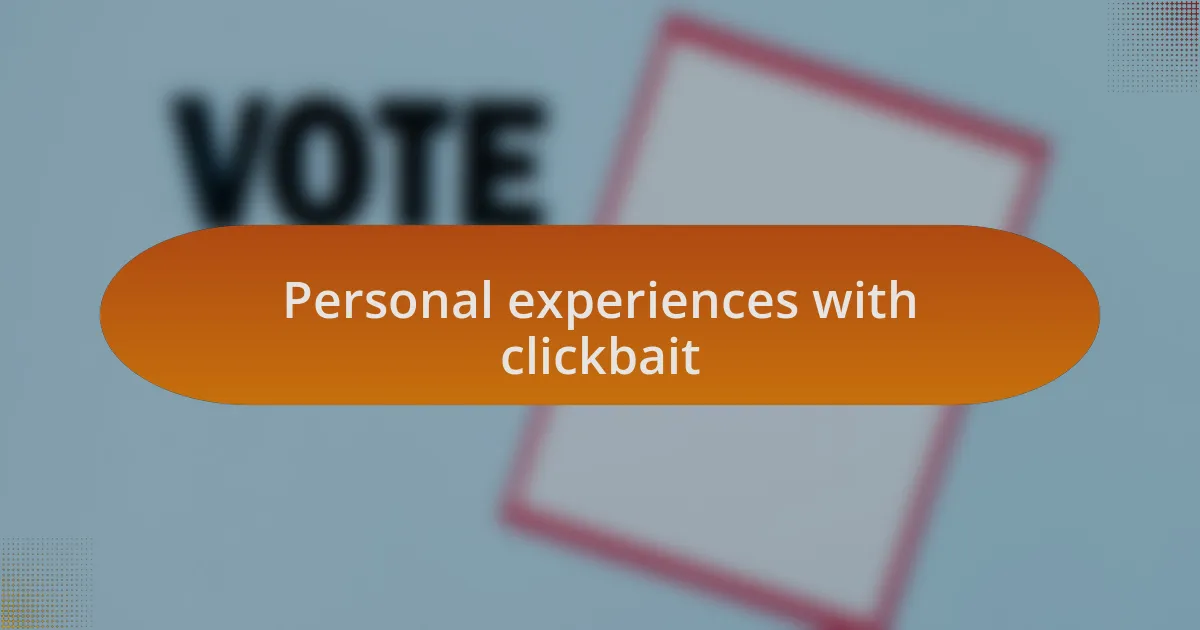
Personal experiences with clickbait
I remember one instance where I clicked on a headline that promised a “bombshell” revelation about a politician I follow closely. I was curious and excited but quickly felt let down when the details turned out to be recycled opinions rather than any new information. It left me wondering—did the writer genuinely believe this was worthy of such a dramatic claim or were they just trying to chase clicks?
Not long ago, I stumbled upon a social media post that boasted about “the truth behind the election results.” Intrigued, I rushed to read it, only to find a collection of conspiracy theories dressed up as facts. It was frustrating, to say the least; how can we have meaningful discussions about democracy when headlines prioritize shock value over truthful reporting?
Another time, a headline caught my attention by claiming that a politician had “betrayed” their base. The article was filled with emotional language that stirred my own feelings, but as I read on, it became clear that the betrayal was a matter of perspective. In that moment, I couldn’t help but think: do these sensational headlines do more harm than good to our political discourse?
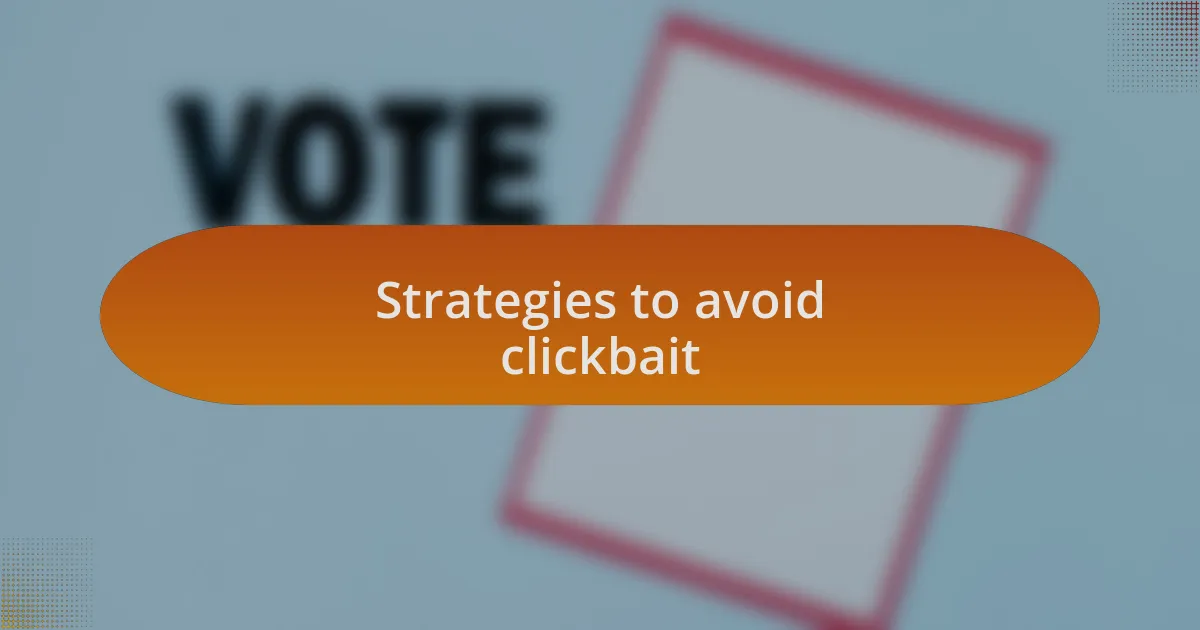
Strategies to avoid clickbait
One effective strategy I’ve found to avoid falling into the clickbait trap is to critically evaluate headlines before clicking. I often pause to ask myself if the headline truly reflects the article’s content or if it’s designed solely for shock value. This practice helps me save time and prevents frustration when I find out that the article doesn’t deliver on its promises.
Another approach is to seek out reputable sources that prioritize honest journalism. I’ve noticed that established news outlets often provide context-rich headlines that give a clearer idea of what to expect in the article. When I intentionally choose these sources, my reading experience becomes so much more rewarding and informative instead of being laden with sensationalism.
Finally, I recommend taking a moment to read the article summary or the first few paragraphs before committing to the full piece. I find that these sections typically reveal the writer’s intent and whether they’re focusing on genuine insight or just trying to provoke a reaction. This simple habit has helped me cultivate a more discerning reading habit, ensuring that I engage with content that enriches my understanding rather than merely entertains.
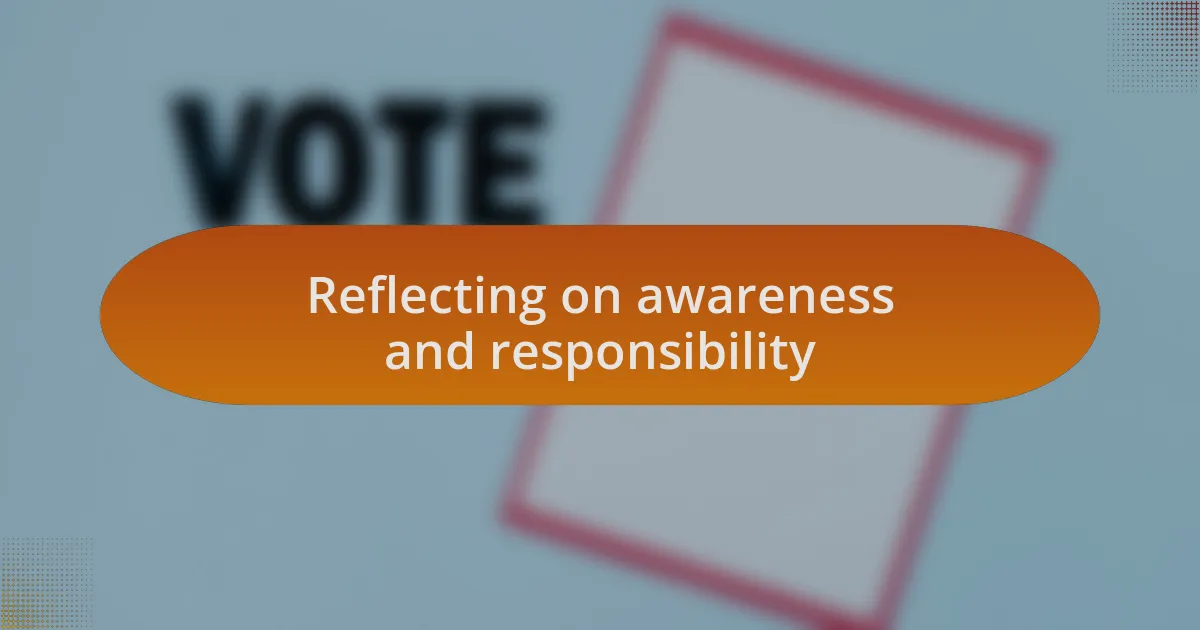
Reflecting on awareness and responsibility
Reflecting on our awareness of clickbait culture often brings me to consider the broader implications of what we consume online. I’ve had moments where I clicked on an alluring headline, only to find myself frustrated by the lack of substance in the article. It makes me wonder: how many insightful perspectives are we missing out on because we prioritize entertainment over genuine information?
Responsibility plays a crucial role in our engagement with media. I recall a time when I shared an attention-grabbing article with friends, only to later realize its misleading nature. This experience prompted me to question my own accountability in sharing information. How often do we stop to think about the potential impact of our online interactions?
When I choose to be mindful about the content I engage with, I feel more empowered. It’s not just that I’m avoiding clickbait; I’m actively participating in a media landscape that values truth and integrity. This shift in focus has allowed me to foster discussions that are enriching rather than divisive, and I feel more connected to others in the process. Don’t we all deserve a thoughtful exchange of ideas?